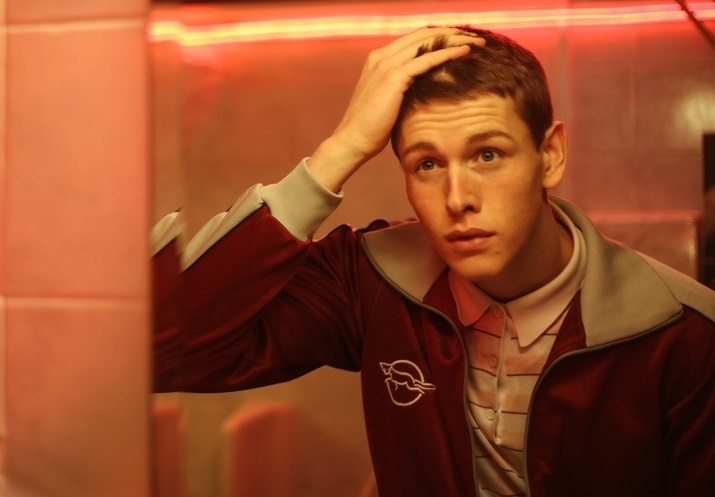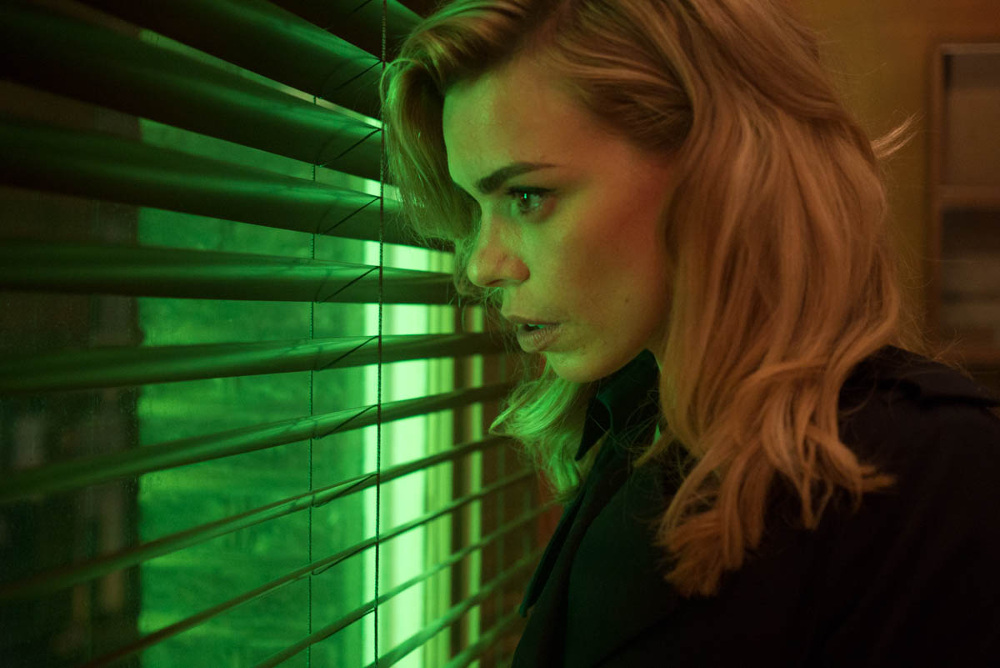Postcards from London is a surprise. You will certainly come away from Steve McLean’s highly stylised film with a new concept of what being an “art lover” can involve, while his subject matter is considerably more specialised, not least in the sexual sense, than its seemingly innocent title might suggest. Mischievously self-conscious in tone, its niche approach to certain established themes – principally gay culture and art history – leavens any pretension with generous humour.
Harris Dickinson plays Jim, an 18-year-old naif (pictured below) who leaves behind the restrictions of his Essex home life – defined equally by parental admonishments and unnaturally confining walls, it’s a literally enclosed world – for the bright lights of the city, Soho in particular. Where he quickly discovers, Whittington-like, that the streets are not paved with gold, though his striking good looks suggest career prospects lie in a familiar direction. But just as Postcards was shot in its entirety in studios rather than on the much-trodden grimy streets of the neighbourhood concerned – Annika Summerson’s cinematography fully relishes the lighting and colouring opportunities that such an approach allows – the experience that Jim comes to offer is rather more aesthetic than sexual. He becomes a member of high-class escort club The Raconteurs, which specialises in post-coital cultural conversation that involves a different kind of boning up to the usual one. The fact that he looks like a Caravaggio model makes history of art Jim’s natural field, and his beauty is soon conquering Soho, though somewhat parodically: the one encounter we witness involves some high-comedy, practically Carry On bathos, involving an elderly and portly CofE gent with a fixation on ancient history shooting rubber-tipped arrows at Jim, who’s modelling for St Sebastian (the real transgression is their smoking indoors). From that it’s a short skip to his becoming a muse for Max, a Soho artist of a definite vintage who’s a cross between Francis Bacon – for his sexuality; Bacon’s lover George Dyer is liberally referenced – and Lucian Freud, for the almost obsessive demands an artist can make on his sitters.
He becomes a member of high-class escort club The Raconteurs, which specialises in post-coital cultural conversation that involves a different kind of boning up to the usual one. The fact that he looks like a Caravaggio model makes history of art Jim’s natural field, and his beauty is soon conquering Soho, though somewhat parodically: the one encounter we witness involves some high-comedy, practically Carry On bathos, involving an elderly and portly CofE gent with a fixation on ancient history shooting rubber-tipped arrows at Jim, who’s modelling for St Sebastian (the real transgression is their smoking indoors). From that it’s a short skip to his becoming a muse for Max, a Soho artist of a definite vintage who’s a cross between Francis Bacon – for his sexuality; Bacon’s lover George Dyer is liberally referenced – and Lucian Freud, for the almost obsessive demands an artist can make on his sitters.
But Jim’s artistic affinities run still deeper: he’s so sensitive to a good painting that he falls into a swoon when he sees one, becoming literally caught up, via dream sequences, in its creation. That makes for some lovely behind-the-canvas scenes where he's modelling for Caravaggio (main picture), an experience of some risk given the world that painter inhabited; played by Ben Cura, he’s a fiery character, succinctly summed up by Jim as “definitely a nutter”. That’s just the kind of down-to-earth touch that McLean’s script captures winningly: Jim’s specialisation in the Baroque is tartly deflated by his pronouncing it “bar-oak”.
Dickinson's bluff humour resonates with the visual stylistics that surround him
His condition is duly diagnosed as Stendhal syndrome: caused by high-concentration exposure to artistic beauties, that’s drawn from real life too (and rather in the news lately, Florence as its epicentre). A late plot strand sees Jim’s unexpected ability exploited in new ways, given that he can now effectively authenticate a work of art – faced with a fake, he’s left cold. Though that’s nicely mined for some satire at the pretensions of the art world, it’s an element left slightly high-and-dry at the end of a distinctly picaresque narrative line (“plot” would probably be an overstatement).
Nevertheless it articulates a distinction that's at the heart of Postcards from London: between loving art, in an almost old-fashioned sense – as The Raconteurs do, and as Jim does, corporeally, when he’s absorbed into it – and restricting it to the realm of commerce. In that sense, McLean – and his collaborators, Sally King (art direction) and Ollie Tiong (production design), every bit as much – is firmly in the former camp. It’s there in the film’s affectionate homage to the Colony Room world of Bacon and Freud (with a nod there, surely, to John Maybury’s Love Is the Devil), as well as a cinematic line that takes in Fassbinder (hints of Querelle) and a very generous dose of Derek Jarman – the only influence not, I think, mentioned here by name – from Sebastiane through to Caravaggio.
They have found a worthy inheritor in McLean, whose command of irony prevents Postcards from taking itself too seriously (arguably, unlike some of those progenitors). It’s certainly a departure for Harris Dickinson after the agonised Brooklyn teenager that he played in 2017’s Beach Rats, and his bluff humour here resonates very nicely with the over-the-top visual stylistics that surround him. Beguiling.
Overleaf: watch the trailer for Postcards from London








 He becomes a member of high-class escort club The Raconteurs, which specialises in post-coital cultural conversation that involves a different kind of boning up to the usual one. The fact that he looks like a Caravaggio model makes history of art Jim’s natural field, and his beauty is soon conquering Soho, though somewhat parodically: the one encounter we witness involves some high-comedy, practically Carry On bathos, involving an elderly and portly CofE gent with a fixation on ancient history shooting rubber-tipped arrows at Jim, who’s modelling for St Sebastian (the real transgression is their smoking indoors). From that it’s a short skip to his becoming a muse for Max, a Soho artist of a definite vintage who’s a cross between Francis Bacon – for his sexuality; Bacon’s lover George Dyer is liberally referenced – and Lucian Freud, for the almost obsessive demands an artist can make on his sitters.
He becomes a member of high-class escort club The Raconteurs, which specialises in post-coital cultural conversation that involves a different kind of boning up to the usual one. The fact that he looks like a Caravaggio model makes history of art Jim’s natural field, and his beauty is soon conquering Soho, though somewhat parodically: the one encounter we witness involves some high-comedy, practically Carry On bathos, involving an elderly and portly CofE gent with a fixation on ancient history shooting rubber-tipped arrows at Jim, who’s modelling for St Sebastian (the real transgression is their smoking indoors). From that it’s a short skip to his becoming a muse for Max, a Soho artist of a definite vintage who’s a cross between Francis Bacon – for his sexuality; Bacon’s lover George Dyer is liberally referenced – and Lucian Freud, for the almost obsessive demands an artist can make on his sitters. 


 Where the film diverges from genre – and, it has to be said, sometimes strikes a slightly jarring note – is in Tommy’s back story: how a tragic episode from his teenage years infiltrates today’s events, kicked off when he unexpectedly encounters school mate Lovely (an oily James Floyd) at the centre of the film’s property scheme. Travis’s tender flashback sequences do raise the question, however, of how the sensitive, damaged teenage Tommy ended up as a streetwise gumshoe with a mean right hook.
Where the film diverges from genre – and, it has to be said, sometimes strikes a slightly jarring note – is in Tommy’s back story: how a tragic episode from his teenage years infiltrates today’s events, kicked off when he unexpectedly encounters school mate Lovely (an oily James Floyd) at the centre of the film’s property scheme. Travis’s tender flashback sequences do raise the question, however, of how the sensitive, damaged teenage Tommy ended up as a streetwise gumshoe with a mean right hook.